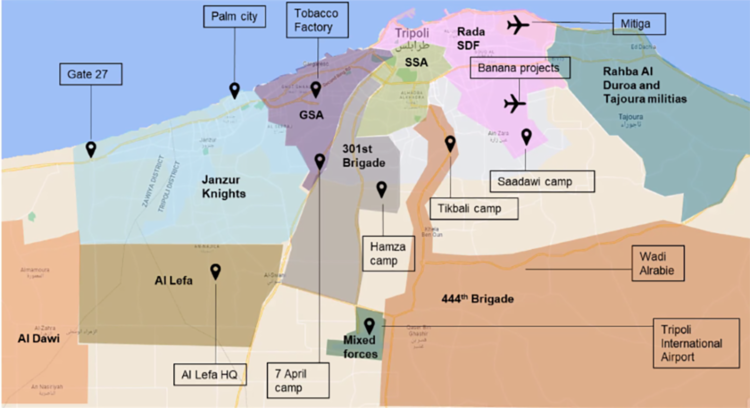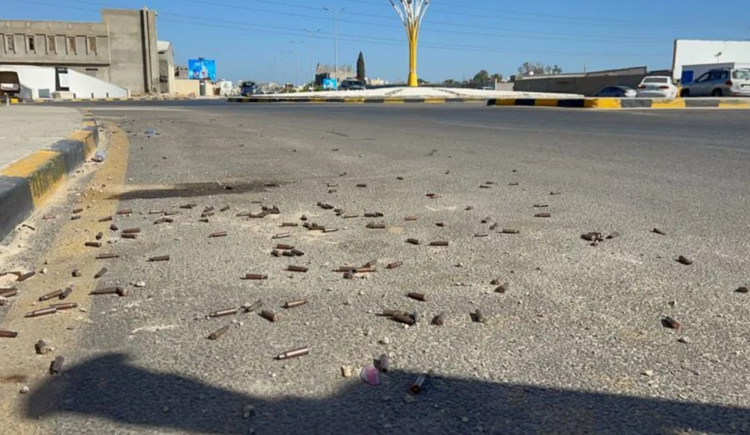'Rehearsal for a coup in Libya': Why fighting broke out again in Tripoli
The massacre in the capital left 55 dead, 146 wounded and shook the regime of Abdul Hamid al-Dbeibeh

On the night of Tuesday, 15 August 2023, two paramilitary groups – the 444th Brigade and RADA Special Deterrence Forces – attacked each other on the streets of the Libyan capital using machine guns, tanks, and artillery. The bloodiest clashes of the year have become a source of rumours of a coup against the government, whose legitimacy is recognised by the UN.
Bloodshed in the coup atmosphere
The trigger for the onset of hostilities was the detention of Mahmoud Hamza, the leader of the 444th Brigade, at the Mitiga International Airport. On Monday, 14 August, he attempted to fly from Tripoli to Misrata but was handcuffed and taken into custody by the Deterrence Forces soldiers who control the airport.
Although the official reason for the arrest has not been announced, Libyan media, as reported by The Arab Weekly, stated that the commander of the 444th Brigade is being accused of plotting a coup against Abdul Hamid al-Dbeibeh in coordination with Khalifa Haftar, the Field Marshal of the Libyan National Army.
As reported by Mind, Haftar's forces along with russian mercenaries from the wagner group attempted to capture Tripoli in 2019. However, the Field Marshal failed to seize the Libyan capital and to become a 'new Gaddafi', and in 2020, the eastern and western parts of Libya signed a fragile ceasefire.
However, in February 2022, supporters of Khalifa Haftar attempted to overthrow the interim government of Abdul Hamid al-Dbeibeh, who was elected in 2021 to oversee democratic elections in Libya but had not yet managed to organise the electoral process. The eastern parliament appointed the former head of the Ministry of Internal Affairs, Fathi Bashagha, as the Prime Minister and found those willing to support this decision.
On 17th May 2022, Bashagha attempted to enter the Libyan capital and overthrow Dbeibeh. The Navasi Brigade sided with him, engaging in a shooting with the Deterrence Forces in the centre of Tripoli. However, they proved unable to bring the eastern Prime Minister to power. On that day, 23 people were killed in the clashes, and another 87 were injured.
"Many people view Bashagha as having aligned himself with strongman Khalifa Haftar, a military commander based in the east who launched a 14-month military offensive on Tripoli back in 2019 and who destroyed their homes and displaced hundreds of thousands of people… [They] can’t just come to Tripoli and assume power," explained Al Jazeera.
Military experts claim that the levers of control in the current government in Tripoli will be taken over by a cartel being formed by local armed groups.
"Since spring 2022, a small group of Western Libyan militia leaders has been meeting regularly with Haftar’s sons and other representatives. These talks are about the distribution of posts and funds, but also more fundamental questions concerning the political process and the conditions for possible elections," asserts Wolfram Lacher, an analyst at the German Institute for International and Security Affairs. "One participant in these negotiations told the author that this group of commanders had come to the realisation that they had to take the political initiative themselves – they could not just let Libya’s politicians 'keep playing their games', and then bear the brunt of fighting if things escalated."
A 'kaleidoscope' on the map of Tripoli
After the overthrow of Muammar Gaddafi in 2011, a security vacuum emerged in the Libyan capital and its surroundings. It was filled with hundreds of militia groups, with the strongest among them becoming enriched and evolving into large private armies. The map of Tripoli, where zones of their influence are colour-coded, changed like a kaleidoscope.
"In addition to providing security for residents and government buildings, Tripoli militias also control the city’s only functioning airport, prisons, immigrant detention centres, and other major infrastructure mainly for cash flow reasons. They also engage in oil smuggling, human trafficking, and drug trade. This engagement in the illicit economy heightened their power by allowing them to operate as a security organisation and criminal network," describes the situation in Tripoli the Atlantic Council.
Militarised groups in Tripoli

Source: US-Libya Business Association (https://us-lba.org/uslba-hosts-expert-roundtable/)
Most armed groups in Tripoli are affiliated with the Ministry of Defence, the Presidential Council, or other state bodies, receiving funding from them and operating under the guise of state legitimacy. However, in reality, they act in their own interests, evading government control and preventing the government from appointing or removing their leaders.
RADA Special Deterrence Forces is an ultra-conservative Islamist organisation that emerged from a combat unit that helped overthrow Muammar Gaddafi's regime on 17 February, 2011. RADA acts as the police force in Tripoli, focusing on preventing murders, kidnappings, and enforcing bans on alcohol and drugs. They control the Mitiga airport and the largest prison in western Libya.
The 444th Brigade is known for its high discipline, uncompromising stance against criminality, and aggressive territorial expansion in Tripoli. Other militia groups view them as a threat to their existence due to their actions. The 444th Brigade has taken control over a significant area in the southern part of Tripoli and initiated operations to track down smugglers in the Libyan desert.
Outcomes of the clashes between the 444th Brigade and the Deterrence Forces
In response to the arrest of Mahmoud Hamza, the 444th Brigade launched intensive shelling at the positions of the Deterrence Forces. Throughout the night until Tuesday morning, the densely populated centre of Tripoli was rattled by mortar and automatic gunfire, resulting in burnt vehicles and scattered bullet casings on the streets.

This demonstration of force led to the release of their commander by Tuesday evening. Representatives of RADA agreed to hand over Mahmoud Hamza to a 'neutral party'. Analysts deemed this decision a sign of weakness that would lead to an escalation of violence.
According to Anas El Gomati, director of the Sadeq Institute, a think-tank focusing on Libya, the clash will be initiated by Mahmoud Hamzi, who has "an enormous standing amongst his brigade, the 444".
"I think he blurs the lines between the political factions that have been largely at peace for the last year in Tripoli and their allegiances towards the government of national unity as it stands … And those that favour a unity government with renegade General Khalifa Haftar," quoted Anas El Gomati by Al Jazeera.
According to experts, the clashes between the 444th Brigade and RADA once again emphasised the common assertion that the relative calm that briefly prevailed in the Libyan capital is illusory and deceptive. The sudden outbreak of violence reminded the 1.2 million population of Tripoli that they are under the sway of numerous armed groups capable of triggering a bloody redistribution of influence at any moment.
If you have read this article to the end, we hope that means it was useful for you.
We work to ensure that our journalistic and analytical work is of high quality, and we strive to perform it as competently as possible. This also requires financial independence. Support us for only UAH 196 per month.
Become a Mind subscriber for just USD 5 per month and support the development of independent business journalism!
You can unsubscribe at any time in your LIQPAY account or by sending us an email: [email protected]


